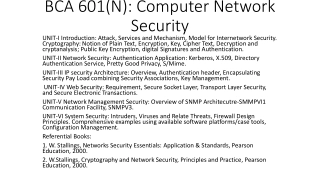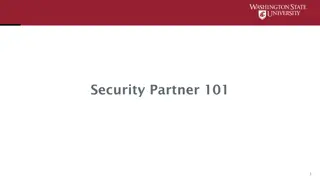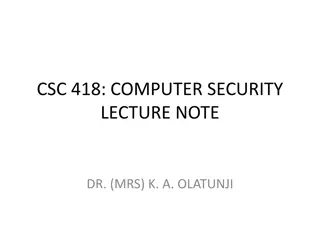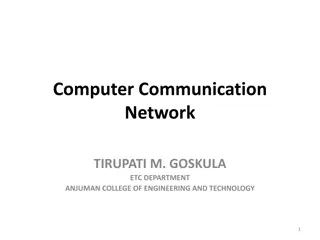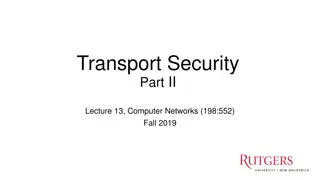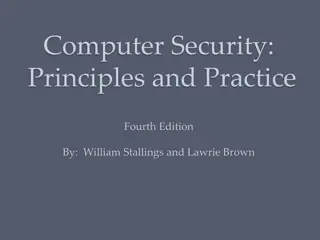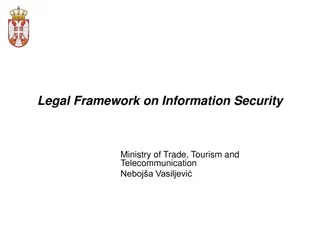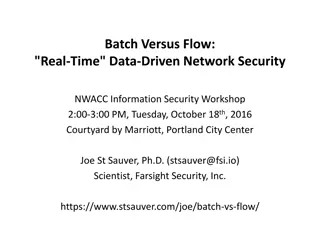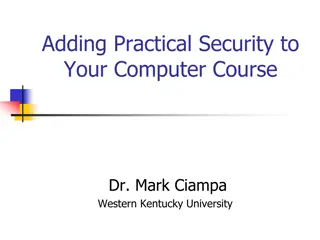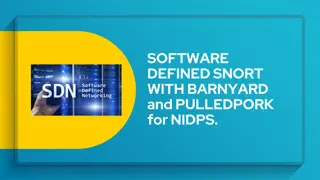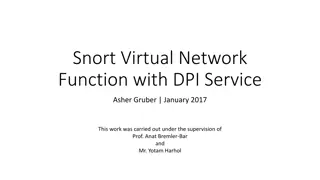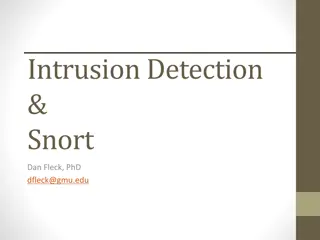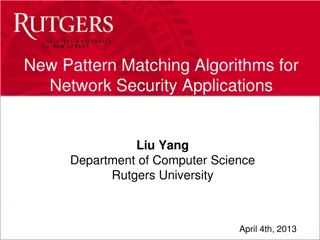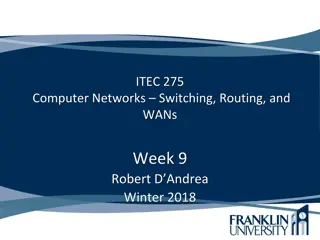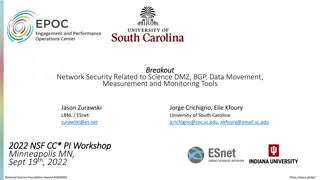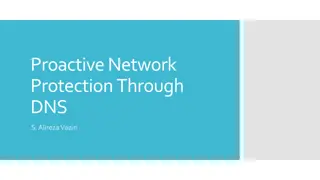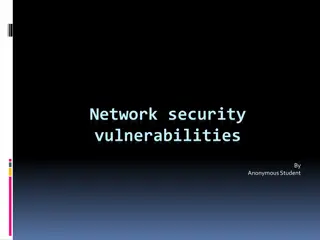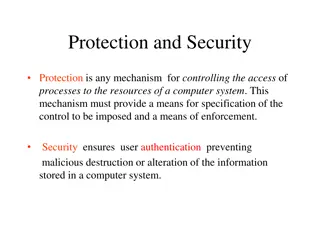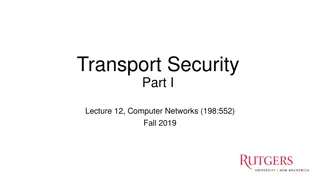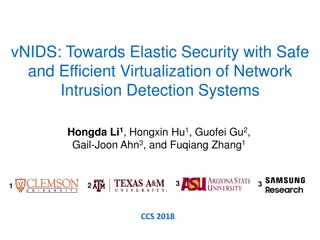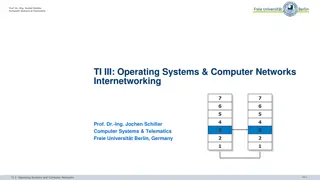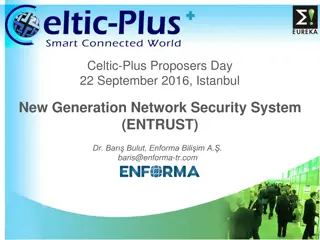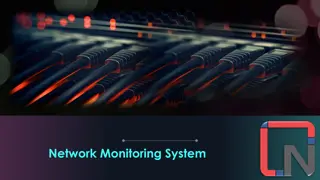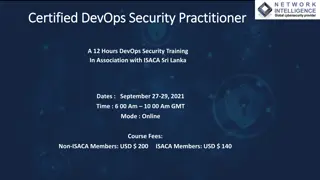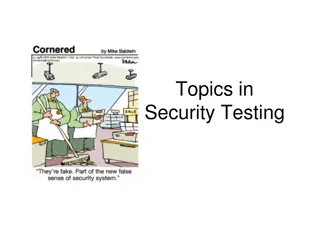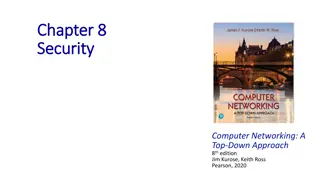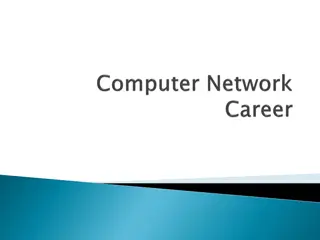BCA 601(N): Computer Network Security
Explore various aspects of computer network security including cryptography, IP security, web security, and system security. Learn about authentication, encryption, key management, and network management security. Real-world examples and best practices covered.
0 views • 23 slides
Understanding Computer Organization and Architecture
A computer system is a programmable digital electronics device that processes data as per program instructions to provide meaningful output. It comprises hardware and software components, with hardware being the physical parts and software essential for driving the hardware. Computer organization fo
14 views • 71 slides
Understanding the Role of Security Champions in Organizations
Security Champions play a vital role in decision-making concerning security engagement, acting as a core element in security assurance processes within a team. They foster a security culture, reduce dependency on the CISO, and promote responsible autonomy and continuous security education in the org
3 views • 13 slides
Comprehensive IT & Security Solutions for Home and Business Needs
ONE STEP SOLUTION offers a range of IT services including computer sales & services, security solutions, CCTV surveillance systems, networking, fire alarm systems, and more. PROLOGIC SOLUTIONS provides reliable IT and security solutions for industrial and residential requirements, specializing in CC
0 views • 15 slides
Understanding the Roles of a Security Partner
Learn about the roles and responsibilities of a Security Partner, including requesting changes to security roles, approving security requests, and initiating access requests. Explore the overview of Workday Security, the security access request process, and the pre-request process flow. Discover how
1 views • 17 slides
Overview of Computer and Network Security Fundamentals
Computer and network systems provide opportunities for cost reduction, efficiency improvement, and revenue increase but also expose us to security risks. This lecture covers encryption, authentication, security services, threats, and countermeasures related to network and computer security. It empha
0 views • 56 slides
Understanding Computer Architecture and Organization
Computer architecture and organization are fundamental aspects of computing systems. Computer architecture focuses on the functional design and implementation of various computer parts, while computer organization deals with how operational attributes come together to realize the architectural speci
3 views • 40 slides
Network Slicing with OAI 5G CN Workshop Overview
Overview of Network Slicing with OAI 5G CN workshop focusing on the crucial role of network slicing in realizing the service-oriented 5G vision. This workshop covers topics like multiple logical networks creation on shared infrastructure, different types of network slices, preparation and instantiat
1 views • 6 slides
Understanding Security Onion: Network Security Monitoring Tools
Security Onion is a Linux distribution designed for network security monitoring using various tools like Full Packet Capture, Network IDS, Host IDS, and Analysis Tools. It offers capabilities for detecting and responding to security incidents effectively, making it a valuable asset for defensive net
1 views • 17 slides
Understanding Weird Logs in Zeek for Network Security Analysis
Dive deep into the world of "Weird" logs in Zeek with Fatema Bannat Wala, a Security Engineer from the University of Delaware. Discover the motivation behind analyzing over 200 types of Weirds triggered in network traffic, explore common types of Weirds, and learn how these logs can reveal crucial i
1 views • 29 slides
Understanding Snort: An Open-Source Network Intrusion Detection System
Snort is an open-source Network Intrusion Detection System (NIDS) developed by Cisco, capable of analyzing network packets to identify suspicious activities. It can function as a packet sniffer, packet logger, or a full-fledged intrusion prevention system. By monitoring and matching network activity
0 views • 23 slides
Understanding Computer Communication Networks at Anjuman College
This course focuses on computer communication networks at Anjuman College of Engineering and Technology in Tirupati, covering topics such as basic concepts, network layers, IP addressing, hardware aspects, LAN standards, security, and administration. Students will learn about theoretical and practic
0 views • 72 slides
Understanding Transport Layer Security (TLS)
The lecture discusses key security properties essential for secure communication in computer networks, such as confidentiality, integrity, authentication, and non-repudiation. It elaborates on cryptographic mechanisms for achieving these properties and emphasizes modularity and reusability in implem
1 views • 26 slides
Progress of Network Architecture Work in FG IMT-2020
In the Network Architecture Group led by Namseok Ko, significant progress has been made in defining the IMT-2020 architecture. The work has involved gap analysis, draft recommendations, and setting framework and requirements. Phase 1 focused on identifying 19 architectural gaps, such as demands for
1 views • 11 slides
Comprehensive Overview of E-Commerce Application Development and Computer Security
Delve into the world of e-commerce application development with insights on asset protection from unauthorized access and the critical aspects of computer security and risk management. Explore concepts like risk management models, elements of computer security, and the importance of establishing a r
1 views • 61 slides
Understanding Computer Security Principles and Practices
This excerpt delves into the fundamental concepts of computer security, highlighting key principles such as confidentiality, integrity, and availability. It also discusses the NIST's definition of computer security, key security concepts, levels of impact, and challenges faced in the realm of securi
3 views • 26 slides
Legal Framework on Information Security in the Ministry of Trade, Tourism, and Telecommunication
The legal framework on information security in the Ministry of Trade, Tourism, and Telecommunication, outlined by Nebojša Vasiljević, includes relevant EU legislation such as Regulation No. 460/2004 and Council decisions on network and information security. The EU legislation covers various aspect
0 views • 21 slides
Real-Time Data-Driven Network Security Workshop by Joe St. Sauver
Explore the insightful workshop on batch versus flow processing in network security conducted by Joe St. Sauver from Farsight Security, Inc. The workshop delves into the dynamics of near-real-time security data analysis and its importance in today's cyber landscape. Joe's unique presentation style a
0 views • 84 slides
Practical Computer Security Course Overview
Explore the crucial aspects of practical computer security in this comprehensive course led by Dr. Mark Ciampa from Western Kentucky University. From analyzing security vulnerabilities to understanding cyber threats and safeguarding your digital assets, this course equips you with essential knowledg
0 views • 114 slides
Enhancing Network Security with Software-Defined Snort and OpenFlow
Explore the implementation of Snort, Barnyard, and PulledPork within a Software-Defined Network framework using OpenFlow technology. Learn how these tools enhance network security through intrusion detection engines, rule management, and network traffic control mechanisms. Dive into the architecture
0 views • 15 slides
Enhancing Network Security Using Snort Virtual Network Function with DPI Service
Deep Packet Inspection (DPI) as a service is explored in this work, aiming to improve performance, innovation, and security in network operations. By extracting DPI from middleboxes and offering it as a shared service, the paper suggests benefits such as optimized packet scanning, enhanced functiona
0 views • 55 slides
Understanding Intrusion Detection Systems (IDS) and Snort in Network Security
Intrusion Detection Systems (IDS) play a crucial role in network security by analyzing traffic patterns and detecting anomalous behavior to send alerts. This summary covers the basics of IDS, differences between IDS and IPS, types of IDS (host-based and network-based), and the capabilities of Snort,
0 views • 34 slides
New Pattern Matching Algorithms for Network Security Applications by Liu Yang
Discusses new pattern matching algorithms for network security applications, focusing on intrusion detection systems (IDS) and the use of signatures and regular expressions to detect malicious patterns in network traffic. Explores the ideal and reality of pattern matching, time-space tradeoffs, and
0 views • 57 slides
IPv6 Security and Threats Workshop Summary
David Kelsey from STFC-RAL presented on IPv6 security and threats at the IPv6 workshop pre-GDB at CERN in June 2016. The workshop covered topics such as IPv6 protocol attacks, issues for site network security teams and sys admins, new features of IPv6, security pros and cons, immediate IPv6 concerns
0 views • 29 slides
Comprehensive Course Review: Security Research Cornerstones at Carnegie Mellon University
Dive into the essential topics of software security, network security, OS security, and cryptography in the course offered by Vyas Sekar at Carnegie Mellon University. Explore control flow hijacks, cryptography terminology, and the importance of network security in protecting data transmissions. Lea
0 views • 41 slides
Understanding Network Management Processes in Computer Networks
Network management processes play a vital role in maintaining the efficiency and security of computer networks. This includes fault management, configuration management, accounting management, performance management, and security management. Syslog, a standard for computer message logging, is utiliz
0 views • 78 slides
Network Security Breakout: Science DMZ, BGP, Data Movement, Measurement & Monitoring Tools
Delve into network security topics related to Science DMZ, BGP, data movement, and measurement tools discussed at the NSF CC* PI Workshop. Key speakers include Jason Zurawski from LBNL and representatives from the University of South Carolina. The workshop covers various aspects of network security
0 views • 13 slides
Understanding Network Analysis: Whole Networks vs. Ego Networks
Explore the differences between Whole Networks and Ego Networks in social network analysis. Whole Networks provide comprehensive information about all nodes and links, enabling the computation of network-level statistics. On the other hand, Ego Networks focus on a sample of nodes, limiting the abili
0 views • 31 slides
Proactive Network Protection Through DNS Security Insights
Exploring proactive network protection methods using DNS, security challenges, botnet threats, firewall management, malware controls, and DNS-based malware control. Discussions on DNS security vulnerabilities, DNSSEC, threat intelligence, machine learning, and best practices like RPZ for DNS protect
0 views • 29 slides
Understanding Network Security Vulnerabilities and Attacks
Explore the world of network security vulnerabilities and attacks, including Denial-of-Service (DoS) and Distributed-Denial-of-Service (D-DoS), security flaws in the TCP/IP protocol suite, ICMP attacks, routing attacks, and TCP attacks. Learn about common security vulnerabilities such as address spo
0 views • 36 slides
Understanding Computer System Protection and Security
Mechanisms like protection and security ensure controlled access to a computer system's resources and prevent malicious activities. Protection involves defining access control levels through models, policies, and mechanisms. Security focuses on user authentication to safeguard stored information. Di
0 views • 25 slides
Understanding Network Security Fundamentals in Computer Networks
Explore the importance of network security in Computer Networks, focusing on key aspects like confidentiality, integrity, authentication, and non-repudiation. Learn about common threats, such as eavesdropping, impersonation, hijacking, and denial of service attacks, and the role of cryptography in e
0 views • 28 slides
Elastic Security Virtualization with vNIDS
Explore the concept of Elastic Security through Safe and Efficient Virtualization of Network Intrusion Detection Systems using vNIDS. This study delves into the challenges of traditional NIDSes, the requirements for virtualized environments, traffic volume variations, new trends in network function
0 views • 36 slides
Overview of Prof. Dr.-Ing. Jochen Schiller's Operating Systems and Computer Networks Course
Prof. Dr.-Ing. Jochen Schiller teaches a course on Operating Systems and Computer Networks at Freie Universität Berlin, Germany. The course covers topics like Networked Computer & Internet, Host-to-Network communication, Transport Layer, Network Security, and more. Reasons for having multiple netwo
0 views • 40 slides
New Generation Network Security System Evolution and Implementation
The presentation outlines the evolution of network security systems, focusing on the transition from traditional firewalls to next-generation systems like intrusion detection systems. It highlights the limitations of current systems in detecting internal threats and the need for advanced solutions t
0 views • 9 slides
Enhancing Network Stability with Network Monitoring Systems
Network monitoring is crucial for efficient management and proactive issue detection in a network environment. Factors influencing an effective network system include choosing the best OEM, SLA agreements, and selecting a reliable System Integrator. Reactive monitoring can lead to financial losses a
0 views • 12 slides
Comprehensive DevOps Security Training Overview
This Certified DevOps Security Practitioner course provides a deep dive into implementing DevSecOps, integrating security into the DevOps processes. Covering topics like security testing, Docker security, automation, and more, the training aims to equip participants with the necessary skills to embe
0 views • 5 slides
Understanding Security Testing and Architecture
Explore the fundamentals of security testing, computer security goals, software security approach, and security architecture. Learn about securing computer assets, verifying trustworthiness of security mechanisms, and validating security architecture through threat modeling. Enhance your knowledge o
0 views • 57 slides
Network Security: A Top-Down Approach Overview
This content delves into the fundamental principles of network security, covering topics such as cryptography, authentication, message integrity, and security measures at different network layers. It explores the concepts of confidentiality, authentication, message integrity, access, and availabilit
0 views • 66 slides
Emerging Career Paths in Computer Networking Field
The demand for individuals with expertise in computer network management is on the rise due to the increasing use of internet-based applications like e-commerce, e-governance, and VPN. Job titles in this domain include Network Administrator, Network Technician, and Network Security professional. Res
0 views • 23 slides
